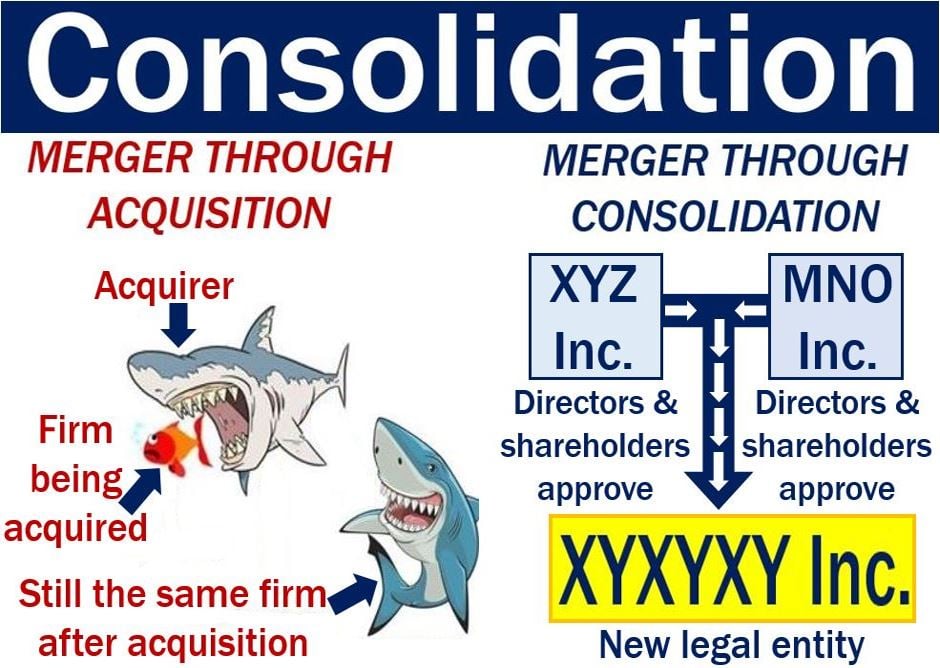Consolidation in business can mean combining separate companies. For example, combining product lines or functional areas into one. It is a type of merger, but in this case, we create a new legal entity.
For example, in 1996, two Swiss pharmaceutical companies – Sandoz and Ciba-Geigy – merged. They became Novartis, which was a new legal entity.
Such strategic consolidation can significantly alter the competitive landscape, often leading to increased market share and bargaining power for the newly formed entity.
Consolidation has many meanings, depending on the situation. Below are some examples:
Market saturation
In some markets, consolidation refers to the process of maturation. In other words, large companies acquire smaller ones while others run out of business. Subsequently, only a few major companies are left. We call this process a ‘shakeout.’
Market saturation occurs when there is too much supply in an industry. The oversupply triggers a wave of mergers, acquisitions, and bankruptcies.
Equity Capital
Consolidation occurs when a company reduces the number of outstanding shares. It does this by combining a specific number of low-value shares into a higher-value one.
In fact, it is fundamentally the same as a reverse stock split.

Data Storage
In information technology, specifically storage terminology, consolidation refers to the concept of centralized storage. Several applications and users share resources.
Organizations have traditionally deployed servers with DAS as file servers. DAS stands for direct-attached storage.
Many organizations are facilitating server consolidation by deploying NAS. NAS stands for network-attached storage).
NAS provides a single-purpose device that provides NFS (Network File System) and CIFS (Common Internet File System) connected storage. The single-purpose device can scale from gigabytes to petabytes.
Become Stronger
In business, the verb ‘to consolidate’ can mean to strengthen a company’s position.
For example: “The success of John Doe’s new product consolidated its position in the market.” This means that John Doe’s position in the market got stronger because of the new product’s success.
Accounting
In accounting, to consolidate means to show the financial results of a group of firms. Specifically, to show them in one set of figures, instead of showing each one separately.
For example: “When a group of companies shares several economic values, it may become necessary to consolidate group accounts.”
Transporting Goods
In the transportation of goods, consolidation may mean putting different items together in one container. For example: “Our shipment will be consolidated with those of other customers and shipped in a container.”
Medicine
In medicine, the term refers to the solidification of cells or other matter in the body into a firm, dense mass.
For example, scientists commonly use the term when talking about lung tissue. Specifically, when the tissue alters from an aerated condition to one of solid consistency.
Consolidation Loan
This type of loan is popular with people who have many different debts. It means to combine them all into one loan.
In most cases, the total monthly repayments are lower than paying back each debt individually.
Consolidated Tax Return
In accountancy, it means to combine all the reports of affiliated companies into one. The parent company owns at least eighty percent of each affiliate.
Strategically, consolidation often allows businesses to streamline operations, reduce costs, and enhance their ability to compete within their industry.
“Consolidation” a derivative of root word “consolidate”
“Consolidation” is a derivative of the root word “consolidate,” which is a verb. Let’s look at some more derivatives of the root word:
-
Consolidation (Noun)
The process of making something stronger or more solid.
For example: “The consolidation of the two departments aimed to improve efficiency within the organization.”
-
Consolidator (Noun)
An agent or company that consolidates shipments or other elements into a single entity.
For example: “As a freight consolidator, their business was to bundle individual packages for shipment.”
-
Reconsolidation (Noun)
The process of consolidating something again or differently.
For example: “The reconsolidation of her memories occurred each time she recounted the story.”
- Consolidating (Verb – Present Participle)
The act of uniting or combining things to make them more effective or stronger.
For example: “She is consolidating her loans to manage her debt more effectively.”
-
Unconsolidated (Adjective)
Not combined into a single, cohesive entity.
For example: “The unconsolidated subsidiaries operated independently from the parent corporation.”
- Consolidative (Adjective)
Having the power or effect of consolidating.
For example: “The new strategy had a consolidative effect on the company’s market position.”
-
Consolidated (Adjective)
Combined into a single, more effective or coherent whole.
For example: “The company’s consolidated financial statements showed an overall increase in profit.”
-
Consolidable (Adjective)
Capable of being consolidated or merged.
For example: “The multiple projects were consolidable into one main initiative.”
There is no adverbial form derived from “consolidate.” We use adverbial phrases like “to consolidate accordingly” or “to consolidate effectively.”
Video – What is Consolidation?
This video presentation, from our sister channel on YouTube – Marketing Business Network, explains what the meaning of ‘Consolidation’ is using simple and easy-to-understand language and examples.
